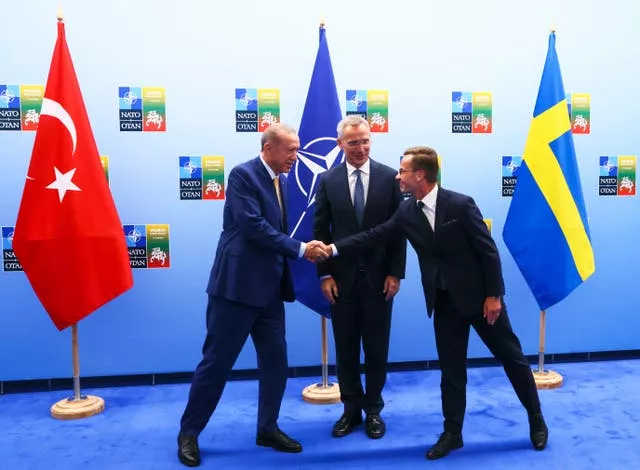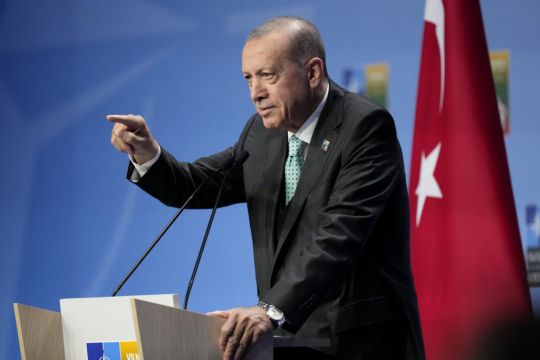Turkey’s president, Recep Tayyip Erdogan, said that Sweden’s Nato membership bid would not be ratified by Turkey’s parliament before October.
Speaking at the Nato summit in Vilnius in Lithuania, Mr Erdogan said that the process would have to wait until after MPs return from a summer recess.
He said: “The parliament is not in session for the upcoming two months … but our target is to finalise this matter as swiftly as possible.”

Turkey on Monday withdrew its objections to Sweden joining the alliance, a step toward the unity that Western leaders have been eager to demonstrate in the face of Russia’s invasion of Ukraine.
The decision by Mr Erdogan was a significant move toward Sweden’s membership and came after days of intensive meetings.
Mr Erdogan’s comments on Wednesday were his first public confirmation of his decision to refer Sweden’s membership to parliament, where his party and its allies command a majority.
The president’s apparent change of heart – after a year of blocking Sweden’s bid – came after Sweden pledged deeper co-operation with Turkey on counter-terrorism and to support Turkey’s ambition to revive its EU membership bid.
In addition, the Nato secretary-general Jens Stoltenberg said the alliance would establish a special coordinator for counter-terrorism.
Mr Erdogan highlighted these commitments, describing a draft roadmap of 17 articles framed by Sweden and presented by Swedish Prime Minister Ulf Kristersson to Mr Erdogan when they met Monday.
He said: “A bilateral security mechanism will be established at the ministerial level and we will increase our cooperation and collaboration in our fight against the terrorist organisations.
“At the same time, Sweden will actively support the Republic of Turkey in the update of the customs union, visa liberalisation and the membership process of Turkey to the European Union.”
Mr Erdogan added that Sweden will help lift arms embargoes imposed on Turkey.
“After those promises are kept, we will of course continue with (Sweden’s Nato) membership process.”
Finland has already become the 31st member of the alliance, and Sweden is on deck to become the 32nd.
Both Nordic countries were historically non-aligned until the war increased fears of Russian aggression.
Turkey wants “this process to be over as soon as possible,” Mr Erdogan said, referring to the ratification process.
The deal would first be discussed by the parliament’s foreign affairs committee before going to a vote in the main chamber.
Mr Erdogan must also win over the political parties aligned to his Justice and Development Party (AKP) that give him a parliamentary majority following elections in May.
These include a small Islamist group, which on Wednesday said it opposed Sweden joining Nato as it “allows attacks on Islamic values” – a reference to the burning of Qurans during protests in Stockholm.
Mr Erdogan also addressed a central point of contention over Sweden’s bid – what Ankara perceives as its soft stance on terrorism, particularly Kurdish militants and those it associates with an attempted coup against Mr Erdogan in 2016.
Turkey has also complained in the past about what it considers terrorist activity in other European countries.
Mr Erdogan welcomed the creation of a “special co-ordinator” for counter-terrorism within Nato.
He said: “Fighting against terrorist organisations is our red line, so from now on we expect all our allies to show a principled stance in their fight against terrorist organisations.”
Turkey’s agreement on Sweden has also been linked to Ankara’s efforts to acquire new F-16 fighter planes and upgrade kits for its existing fighter fleet from the US.
Both Turkish and US officials have denied any connection but on Tuesday, president Joe Biden signalled that the United States intended to proceed with the sale.
When asked about the F-16 deal, Mr Erdogan said: “I’m much more optimistic than I’ve ever been.
“Mr Biden stated that he will do his best and that he will follow this process and he said that he’s optimistic about it.
“But just as the parliament in Turkey has to ratify an agreement, in the United States the Congress has to ratify it.”







